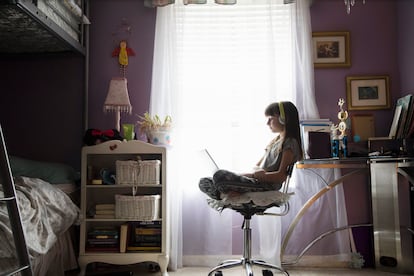At what age can I leave my child home alone?
Experts share some recommendations on how to give minors a sense of security and independence so they can stay home without adult supervision when the time comes

The popular movie Home Alone is a funny tale that teaches us what can happen when a child is left in the family house with no adults around. However, reality does not always resemble fiction; sometimes, it does not even come close. Parents tend to be more reluctant than minors when it comes to leaving them unsupervised at home, explains health psychologist and family therapist Sara del Pie: “It is to be expected that parents feel fear and anxiety, especially the first few times, but separation is part of growing up, and this experience helps minors to be more independent and autonomous in the future.”
When should you begin to think about leaving a child alone? “This question does not have a single answer,” explains Del Pie. “A child being left alone at home is part of the process of becoming an adult, and the parents have to accompany them on that path.” For the expert, 12 is an appropriate age, although she clarifies that is not the only factor that must be taken into account. “There are other factors that influence, such as their emotional maturity or the ability to meet their needs.”
Leaving a minor with no adults at home conveys the message that they are capable of taking care of themselves. “If something happens, you have to be sure that they can solve or manage the problem, so in addition to being able to protect themselves, they don’t feel guilty and insecure,” says Fabiola Rincón, a clinical psychologist at the Rey Juan Carlos University Hospital in Madrid, Spain. “We also have to keep in mind that, as capable as the child is, we are making them responsible for something that may not be appropriate, due to their developmental stage and age.”
The psychologist mentions some variables that parents should take into account when making this decision: “Cognitive development, or their ability to reason and think, which will allow them to know if something is dangerous or not, as well as the capacity to act responsibly, which will depend on their personality and degree of maturity.” A child, for instance, may act foolishly because they are overcome by their curiosity and need to explore, which can entail a risk. Rincón emphasizes that a child can meet the two previous requirements but still lack the necessary level of autonomy to solve a problem that may arise, which is why “all these aspects must be assessed in order to know if they are ready to stay home alone.”
“Children must be able to feel safe and competent so they can regulate their emotions in the absence of an adult,” as well as entertain themselves or ask for help from others if necessary, says Del Pie. The health psychologist and family therapist lists several guidelines that can help facilitate this process, which, in addition, should be gradual:
Talk to the children about the expectations they have from this situation, with questions like: What would you do? How do you think you would feel if you stayed by yourself while I take out the garbage? Their answers can tell adults about the minor’s perceived needs and the kinds of support they can offer them.
Teach them the necessary skills to ensure their physical and emotional safety so that they can act in an emergency, with guidelines such as who to call and how to reach their parents’ phone or an emergency number. A playful practice drill can be organized, in which they call their parents from another room or rehearse different situations.
Give clear indications as to what they can and cannot do when adults are not at home, such as watching television, opening the door or avoiding certain electrical appliances.
Provide clear information about the time that you are leaving and coming back and how long they will be alone. Also, explain what the adults will be doing during their absence, such as picking up a sibling from school; this will give them a greater sense of security.
Calmly say goodbye before leaving and remind them that they can call whenever they need to.
Start the process gradually over short periods of time, even as little as two minutes, and do it at times when they are calm and relaxed, such as when they don’t have any homework to do.
Greet the child when you return home and ask how they felt while they were alone. If they were calm and comfortable, their unsupervised time can be gradually extended; if they felt scared and sad, it is advisable to shorten their time of solitude. It is also a good idea for the parents to call home while they are out.
Sign up for our weekly newsletter to get more English-language news coverage from EL PAÍS USA Edition
Tu suscripción se está usando en otro dispositivo
¿Quieres añadir otro usuario a tu suscripción?
Si continúas leyendo en este dispositivo, no se podrá leer en el otro.
FlechaTu suscripción se está usando en otro dispositivo y solo puedes acceder a EL PAÍS desde un dispositivo a la vez.
Si quieres compartir tu cuenta, cambia tu suscripción a la modalidad Premium, así podrás añadir otro usuario. Cada uno accederá con su propia cuenta de email, lo que os permitirá personalizar vuestra experiencia en EL PAÍS.
¿Tienes una suscripción de empresa? Accede aquí para contratar más cuentas.
En el caso de no saber quién está usando tu cuenta, te recomendamos cambiar tu contraseña aquí.
Si decides continuar compartiendo tu cuenta, este mensaje se mostrará en tu dispositivo y en el de la otra persona que está usando tu cuenta de forma indefinida, afectando a tu experiencia de lectura. Puedes consultar aquí los términos y condiciones de la suscripción digital.









































